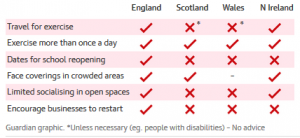With the confusion that has occurred as a result of Prime Minister Boris Johnson’s speech on 10th May, namely what applies to who, it would be interesting to look at the COVID-19 response from the lens of the UK’s devolution system. This article will firstly give a brief explanation of what devolution is before looking at the different approaches now being taken by the UK’s constituent nations – England, Scotland, Wales, and Northern Ireland. The article will also look at what possible effects the UK’s COVID-19 response could have on its devolved system of governance.
Devolution is the ‘transferring [of] power from the centre to the nations and regions of the United Kingdom’ and is different from a federal system of government due to the ‘constitutional tradition of “parliamentary sovereignty”’ – meaning that the process can be reversed with power returning to the centre.1 As part of this system, Scotland and Wales both have national Parliaments whilst Northern Ireland has a National Assembly. All three possess executive and legislative powers, meaning they can make their own policy in areas such as public health and education – however, key areas of policy are still held in the centre at Westminster including Defence, Foreign Affairs, Immigration and Trade.2 3
Whilst the majority of the major public services needed when responding to the COVID-19 pandemic are devolved, it is common practice for states to work in tandem during a crisis. This has been shown by the participation of Nicola Sturgeon, the First Minister of Scotland, Mark Drakeford, the First Minister of Wales, Arlene Foster, the First Minister of Northern Ireland, and Michelle O’Neill, the Deputy First Minister of Northern Ireland in COBR (Cabinet Office Briefing Rooms) meetings chaired by the Prime Minister, Boris Johnson.4 5

The divergence in COVID-19 responses has served only to further highlight the tensions already existing in the devolution system between the devolved nations and Westminster. To many, Boris Johnson’s lack of differentiating between England and Britain has been a source of contention and highlights the confusion and division in the UK’s COVID-19 approach – in effect acting only as Prime Minister for England.9 This view has been more prevalent among the nationalist parties of each devolved nation such as Plaid Cymru who’s MP, Liz Saville Roberts, claimed that Boris Johnson was governing as the Prime Minister for England only.10 Similar statements have been made by the SNP with Nicola Sturgeon commenting on the UK’s change in approach from ‘Stay at Home’ to ‘Stay Alert’ saying ‘we should not be reading off each other’s plans in newspapers’.11 This is exemplified by England’s move away from the four-nation approach, as described by Plaid Cymru leader, Adam Price, ‘we now have a three-nation approach from Wales, Scotland and Northern Ireland with a simple, clear stay at home message’ further damaging the image of a united country.12
The UK’s four-nation approach to the COVID-19 pandemic began strongly, as illustrated by Boris Johnson’s announcement of a lockdown on the 23rd March being followed by similar statements from the First Ministers of the devolved nations.13 However, as the crisis long-standing issues have begun to reappear with inevitable political tinges beginning to appear in each nation’s response. In Scotland for example, the need to push back against British hegemony is apparent in their decision to name the COVID-19 field hospitals, known in England, Northern Ireland and Wales as Nightingale Hospitals, after the Scottish nurse Louisa Jordan, who died in the Second World War.14 A decision emphasising the SNP’s pro-independence credentials. Issues have also arisen between the Welsh government and their English counterparts over competition for coronavirus test kits, with the Welsh government lodging a complaint that, as they are a smaller government, they are at a disadvantage when competing for these kits.15 Not one to be left out, Northern Ireland have also had their troubles with historic issues in the country threatening to play its part in their COVID-19 response after the deputy First Minister and Sinn Fein politician Michelle O’Neill on several occasions has indicated support for an all-Ireland response as opposed to an all-UK one.16
Whilst the UK deals with the COVID-19 pandemic over constitutional issues are lurking in the background, which could influence the long-term integrity of the union. With the ever-present constitutional question hanging over Northern Ireland and the burgeoning support for a second referendum on independence in Scotland, as well as the whispers of discontent in the Welsh parliament, it is of paramount importance that all constituent members of the UK coordinate and co-operate their COVID-19 approaches; not only to produce an effective response to COVID-19 but also to ensure the political future of the country.


